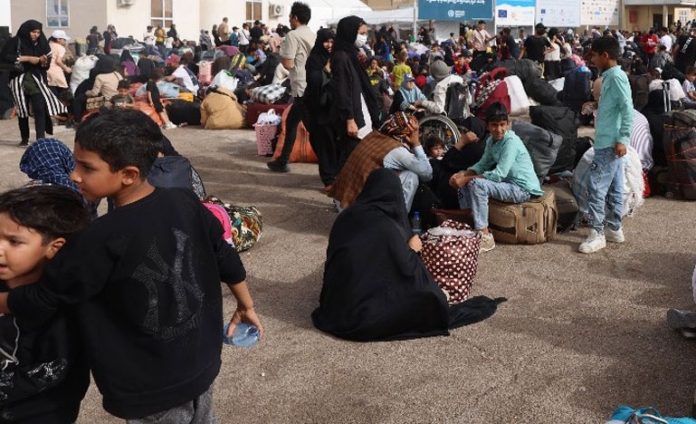Iran deported 256,000 Afghans in June amid growing concern for returning refugees to their Taliban-ruled country already struggling to cope with severe humanitarian crisis.
Afghanistan has been under a strict Taliban rule since 2021 U.S. withdrawal with shrinking socioeconomic freedoms and lack of international aid exacerbating challenges for common people.
So, far more than 700,000 Afghan migrants have moved back to Afghanistan from Iran.
Releasing the figures, the UN International Organization for Migration (IOM) warned of immense pressures on Afghanistan’s overstretched support systems.
Ninety-nine per cent of the returnees were undocumented, and 70 per cent were forcibly expelled from Iran.
“The scale of returns is deeply alarming and demands a stronger and more immediate international response.”says @IOMchief, as over 256,000 #Afghans returned from #Iran in June alone.
IOM is calling for urgent international support to meet rising needs. https://t.co/JpHc3j5dpd pic.twitter.com/grjmiEOgQg
— IOM – UN Migration 🇺🇳 (@UNmigration) June 30, 2025
The latest deportations saw a steep rise in families being moved back to Afghanistan while in earlier most returnees were single young men.
Tehran ordered all undocumented Afghans in March to leave the country.
Conditions deteriorated further after the recent 12-day conflict between Iran and Israel, which caused the daily refugees crossings to skyrocket from about 5,000 to nearly 30,000, according to Arafat Jamal, the UN refugee agency (UNHCR) representative in Afghanistan.
“They are coming in buses and sometimes five buses arrive at one time with families and others and the people are let out of the bus and they are simply bewildered, disoriented, and tired and hungry as well,” he told UN News, an international news website, describing the scene at a border crossing.
“This has been exacerbated by the war, but I must say it has been part of an underlying trend that we have seen of returns from Iran, some of which are voluntary, but a large portion were also deportations.”
Trump bans travel from 12 countries including Iran and Afghanistan
Afghanistan, already grappling with economic collapse and chronic humanitarian crisis, is unprepared to absorb such large-scale returns.
Meanwhile, UNHCR alongside partners is working to address the urgent needs of those arriving – food, water, shelter, protection. However, its programs are also under severe strain due to limited funding.
The agency had to drastically reduce its cash assistance to returnee families at the border from $2,000 per family to just $156.
The 2025 Humanitarian Needs and Response Plan calls for $2.42 billion in funding, but only 22.2 per cent has been secured to date.
“The scale of returns is deeply alarming and demands a stronger and more immediate international response,” said IOM Director General Amy Pope, “Afghanistan cannot manage this alone.”
“We are not able to help enough women, and we are also hurting local communities,” added Jamal.

Asim Tanveer is a seasoned journalist with a passion for photography. He has been working for some of the world’s leading news organizations including Associated Press (AP), Reuters, BBC, CNN, CNBC, Star TV, Voice of America and The New York Times. He has won several awards for his live coverage of events that include a Reuters News Agency World Award.
Follow for more: Twitter (X) | Facebook | Instagram | LinkeIn















